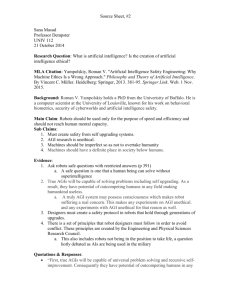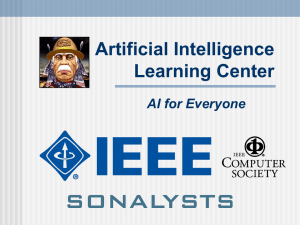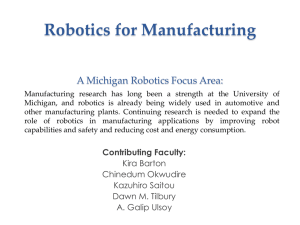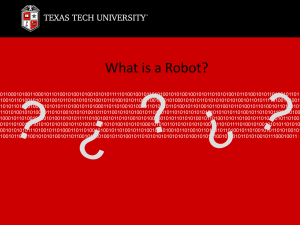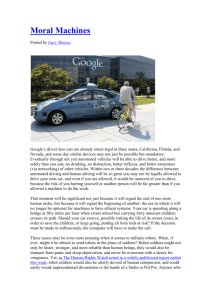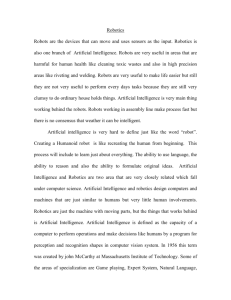Vivanco Karla Vivanco Professor Theresa Simonsen ENGL
advertisement
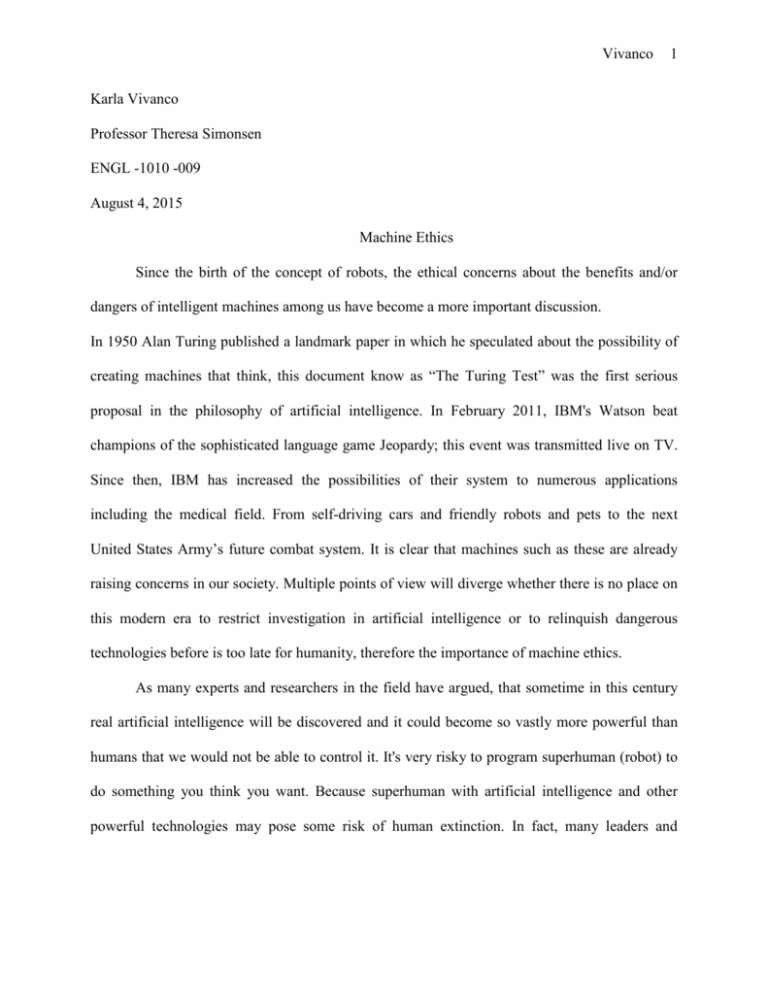
Vivanco 1 Karla Vivanco Professor Theresa Simonsen ENGL -1010 -009 August 4, 2015 Machine Ethics Since the birth of the concept of robots, the ethical concerns about the benefits and/or dangers of intelligent machines among us have become a more important discussion. In 1950 Alan Turing published a landmark paper in which he speculated about the possibility of creating machines that think, this document know as “The Turing Test” was the first serious proposal in the philosophy of artificial intelligence. In February 2011, IBM's Watson beat champions of the sophisticated language game Jeopardy; this event was transmitted live on TV. Since then, IBM has increased the possibilities of their system to numerous applications including the medical field. From self-driving cars and friendly robots and pets to the next United States Army’s future combat system. It is clear that machines such as these are already raising concerns in our society. Multiple points of view will diverge whether there is no place on this modern era to restrict investigation in artificial intelligence or to relinquish dangerous technologies before is too late for humanity, therefore the importance of machine ethics. As many experts and researchers in the field have argued, that sometime in this century real artificial intelligence will be discovered and it could become so vastly more powerful than humans that we would not be able to control it. It's very risky to program superhuman (robot) to do something you think you want. Because superhuman with artificial intelligence and other powerful technologies may pose some risk of human extinction. In fact, many leaders and Vivanco 2 experts in the field have already given their opinion and concerns because future behavior is intrinsically unpredictable. (Luke Muehlhauser). As Patrick Lin says that government institutions will always be interested in military advancements. Military Robotics can be used to help on the battlefield and especially in dangerous areas like diffusing bombs etc. This robot could take the command of a human as an assistant. On the other hand there is a human risk for society to fall into a “policy vacuum” where the technology advancements in robotics will surpass the ethics. Because of the inadequate regulations over robotics, there will be a risk of public backslash against overall technology advancements this will likely to put artificial intelligence research at stake. Nevertheless, the Machine Intelligence Research institute (MIRI) has proposed a research guide for scientists to follow and help build a friendly AI future where all technology advances must be considered safe and humane. As a result of the investigation realized for multiple institutions its predicted that machines will reach human-level intelligence by 2030, if this ever happens we can be assured that there will be well established protocols by that time in the future. The objective is to make artificial agents smarter than human but safe and robust. Given the importance of machine ethics to help shape the future of humanity and robotics, we also need politics and leaders to become more involved on the subject. AI researchers working with ethicists and lawmakers might find an answer to the problem and consequently the ability to decide whether a robot will gain rights and have moral responsibility over their acts. (MIRI) We live in an age of increasingly smart machines. It is my belief AI is a powerful technology. A powerful technology can be used for good things like curing disease, improving road safety and treatments, and also could be use for bad things like killing people. Powerful Vivanco 3 technology, it must be handled with care. There should be laws and treaties to prevent its corruption. But the dangers of AI robots taking over the world and killing us all is both extremely unlikely and very far in the future. However, I have a hard time believing an AI will want to destroy humanity and as much as I take the long-term risk of AI. Andre Forni says that our life’s in the future will strongly depend of machines. Every important decision will be accompanied by a machine interpretation; on the other hand this is more likely to affect humans in their social behavior and roles in the society. For this reason, the anticipated human-robot interaction and acceptance will likely to trigger public awareness of machine ethics, anthropomorphism of robotics and dehumanization. Although, there is a big part of the human population that fear robots because they have prove to do trivial or repetitive tasks better than humans, the true is that robotics are already creating new jobs and employment will become more specialized. The technological advancements in Robotics and Artificial Intelligence is not the first field to face a growing challenge, it shares ethical problems with other fields of science and technology most of them are derived from the Second and Third Industrial Revolutions. Given the huge potentials of robotics and AI to help humankind on its evolution. Foremost is the need for a dialogue between ethicists and researchers in Artificial Intelligence. Both parties will benefit from this cooperation. Perhaps ethicists will even learn from machines and discover the fundamental principles of ethics, while AI researchers, will some day convince the general public that ethical machines can be created, machines that might serve to improve the lives of human beings forever. Vivanco 4 Bibliography Alan Turing, “The Turing Test” Stanford Encyclopedia of Philosophy. First April 9, 2003; substantive revision Wed Jan 26, 2011. http://plato.stanford.edu/entries/turing-test/ Andrea Forni, “Robots. The New Era. Living, working and investing in the robotics society of the future” 2015. https://books.google.com/books?id=R1ksBgAAQBAJ&dq=robots+society&source=gbs_ navlinks_s In this eBook, the author describes how our lives will be in the future when robots will become part of the human society. The content is based on how humanity will accept or reject robots on their daily life, also it mention the current efforts to bring down the barrier and rejection for autonomous robots taking importance in other aspects of human life, like jobs, services and industrial sectors. It also discusses the importance of the government and politics on shaping the ethical and cultural factors that will surround us in the future. Although, there is a big part of the human population that fear robots because they have prove to do trivial or repetitive tasks better than humans, the true is that robotics are already creating new jobs and employment will become more specialized. In my personal opinion, I believe this will help humanity to evolve even more and focus our specie to figure different ways to colonize the space and survive the future challenges of human overpopulation. Bianca Bosker “Google's New A.I. Ethics Board Might Save Humanity From Extinction.” HUFF POST TECH, January 30, 2014. http://www.huffingtonpost.com/2014/01/29/google-ai_n_4683343.html George A. Bekey “Robots Ethics: The Ethical and Social Implications of Robotics” Book, December 9, 2011 Hakli, Raul, Norskov, Marco, Seibt, Johanna “Sociable Robots and Future of Social Relations” In Frontiers in Artificial Intelligence and Applications, Press 2014. http://web.a.ebscohost.com/ehost/detail?sid=40c1547e-5438-4814-a896fbfb36746c07@sessionmgr4002&vid=26#AN=939645&db=nlebk The author discusses many pragmatic approaches for the potential for robots to assist humans in many different domains, from healthcare, education and manufacturing and beyond with implications to social ontology and normativity over robots. He describes how humanity will be more open and willing to rely on robots and how robots will gain commitment, what would be their social functions and their roles in society. Otherwise, the philosophical look at what is called the “uncanny valley” where the humans will experience an strange feeling of “unnaturalness” as they interact more and more with robots carefully designed to look human Vivanco 5 Illah Nourbakhsh. “Google’s Robot Army” The New Yorker, December 16, 2103 http://www.newyorker.com/tech/elements/googles-robot-army In this Article Illah Nourbakhsh talks about the new generation with robots. They’re some creations already like Cheetah that can run fast a 44.7 km/h. With this being said, the author is worried about something he calls “robot smog”, he came across this term base on his thoughts related to human robot interaction, how society is not ready to interact non humans being on a daily basis even the government has very non specific laws for this upcoming human interaction. One of the things that he is concerned is the personal data privacy. Now days, people are used to interact with machines in their own terms like basically the human tells the machine what to do, like way we interact with our phones, TV, DVD, etc. We do not know how to interact autonomous machine that no longer waits for our decision. Louise Aronson. “The Future of Robots Caregivers.” The New York Times. July 19, 2014. http://www.nytimes.com/2014/07/20/opinion/sunday/the-future-of-robotcaregivers.html?_r=0 In this article Louise Aronson is either a Nurse or a Doctor who is worried about the older Americans. As Doctor she can give solution for a pain or any disease that the patient can have. But as a Doctor or Nurse or even a CNA person cannot be there with her or him for a prolonged time. As a normal Human of any age, an older adult also needs companion and care everyday. Because it is old, it needs care 24 hours. Caregiver is a heavy work; a job that not many people wants to do it, for their love ones. That’s why older human needs a Robot Caregiver. A Robot who help lifting and moving is not enough to older people, also have to be a nice companion who talks and listen to their needs. Robots could help to avoid accidentals and abuse from humans who are guilty. Luke Muehlhauser “Machine Intelligence Research Institute” “Intelligence explosion FAQ” MIRI 2015 “Intelligence Explosion FAQ” https://intelligence.org/ie-faq/ Luke Muehlhauser, Louie Helm. "Intelligence Explosion and Machine Ethics". In Singularity Hypotheses: A Scientific and Philosophical Assessment, edited by Amnon Eden, Johnny Søraker, James H. Moor, and Eric Steinhart. Berlin: Springer. 2012 https://intelligence.org/files/IE-ME.pdf (1)Patric Lin. “Robot Ethics: The Ethical and Social Implications of Robotics” The Center for Internet and Society, December 15, 2010. Vivanco 6 http://web.a.ebscohost.com/ehost/ebookviewer/ebook/bmxlYmtfXzQxNDIzOF9f QU41?sid=40c1547e-5438-4814-a896fbfb36746c07@sessionmgr4002&vid=24&format=EB&lpid=lp_299&rid=0 In this book, the authors discuss the different areas where robotics are questioned. One of the most remarkable discussions take place in what he calls the robot ethics and the turing triage test, where he compares the life of a human patient versus the life of a robot, in this scenario the person, who need to make the decision to either save the human or the robot, have a moral dilemma, based on the fact that humans some day in the future will be able to overcome the current challenges for artificial intelligence and will succeed in the creation of a genuine artificial intelligence. Also, they ask the audience to determine when a machine or computer will gain rights and be threated like a human being. He also pointed out the term “robot slavery” where he formulates a question if is morally permissible to enforce or reject the servitude on robots. Nevertheless, the discussion that takes place in the chapter named after “Psychology and sex”, where the anthropomorphization of robots is an important topic not only for privacy implications but for the increasing public acceptance, even affinity towards robots will make people in the future to fall in love with robots. Also, one of the trending ideas of the future is the widely accepted term for “sexbots” that will soon replace or become an alternative to human sex workers, this thought leave us with a unanswered question, how such use affects other human intimate relationships and if this would ever be considered infidelity. (2)Patrick Lin, “ROBOTS, ETHICS & WAR” The Center for Internet and Society, December 15, 2010. http://cyberlaw.stanford.edu/blog/2010/12/robots-ethics-war In this article, the author talks about robots and their military usage and how ethics are always behind in technology compared to the military. Furthermore, the discussion takes place in how society will accept or reject human enhancement through technology and robotics, where terms like cyborgs are common after seeing in these days advanced prosthetics such a bionic knee, again, human and robotics will serve the same goal of creating a better warfighter for the military interest and purposes. One of the remarkable examples cited is the human genome project, where the slowness of the ethics conducted the humanity to fall into a “policy vacuum” where it took almost eighteen (18) years for the US congress to finally pass a bill to protect citizens from discrimination based on their genetic information. It is pretty clear that most of the technologies advancements are being used for military purposes and there is always the risk of public backslash against their usage. Tanya Lewis “Jeopardy! Winning Computer Now Crunching Data for Science.” Live Science. August 2014 Vivanco 7 Self – Assessment My first goal on this class was to learn the right process and structure of a Rhetorical writing essay. I was to be able to participate on class, interacting and making critical reviews in peer reviews with different classmates and this exercise help me a lot to heard different opinions. I also was be able to write a reflection and developed a better writing through many revisions, understanding myself as a writer and thinker. I definitely approached my goal on this class; EGL-1010 was a challenge for myself. This last essay it was a tough topic, I have realized that I choosed an extended topic, hard to be able to write just about one or two main ideas. Even though its was a challenge researching on this topic, because there are so many subjects to talk about Artificial Intelligence that included technology to be more understandable on my writing examples of the technology advances. About my topic, it has been occurring so many advances on the technology through the last years. So many projects and plan to our future to a better future, superhuman knows as AI can be beneficial in many ways to the humanity from helping to our older people and help on military wars or even just teaching on schools. But there is always a scary side of AI because as they will be able to take their own decision in the future that will be a major difference to us the humans.
